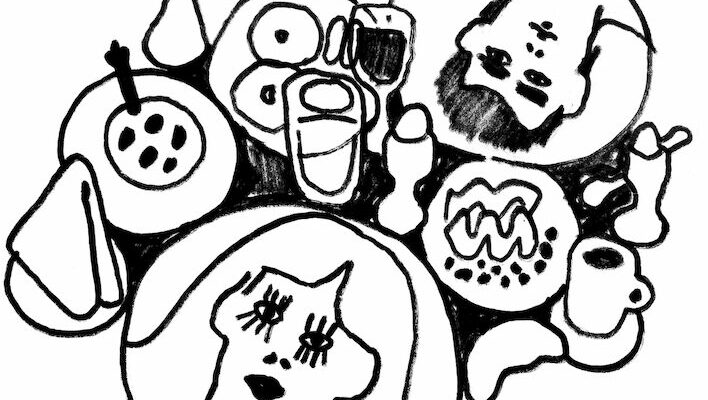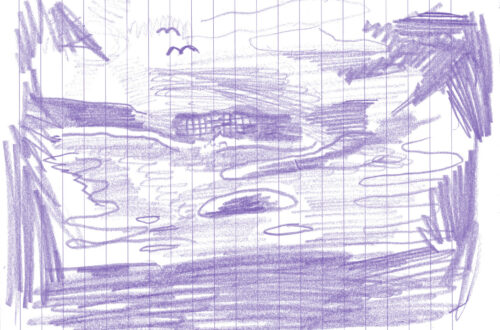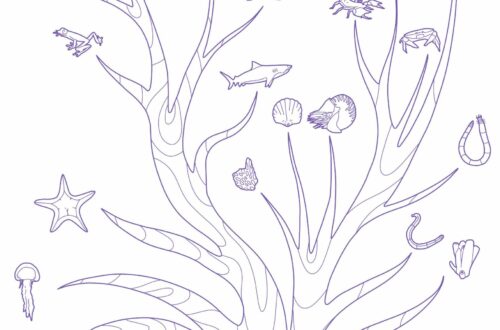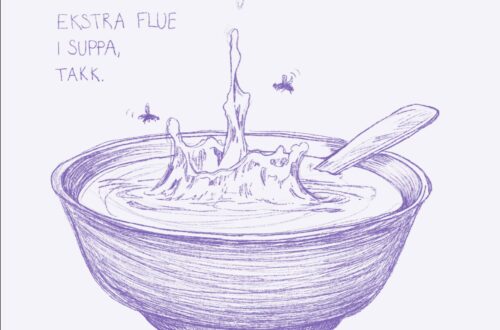Skrevet av Matilda Forss
But they were having breakfast at the hotel. All was calm. Waiters, stiff as buildings, stood at attention, hovering. There were scrambled eggs, salads, fresh fruit, and croissants. There were several types of cereals and several kinds of breads. Esther didn’t want any of it. She had collected a rather impressive field of food onto the table alongside her best friend, who sat opposite her, looking like a cow grazing. The plates and glasses littered the field and were pushed together, as best as circular forms can be. They left small pools of space between them; gaps of room. She thought of a joke. She thought of atoms. She thought of a movie.
She thought: what does the first interaction do to a relationship? The two of them had first met in a bathroom, him washing his hands, her realising that the other basin was clogged. She had moved to the side, theatrically putting her hands behind her back, waiting. He, having washed his hands, moved theatrically aside to let her wash hers. She looked now at the cow’s eyebrows.
They had always considered it a platonic meet cute. Now the differences were piling up, in money, in attitude, in benevolence. How easily she forgave him. How easily he scorned her. And how easily none of it seemed real. Was there always going to be this air of theatre between them; in what they did? The movements mocking and imitating? Rather than how they would normally pick up a cup, put it to their lips, drink a sip and put it down, they did so again and again in the way an actress overacts; the way a character who is determined to be seen from the furthest, highest rows, drinks from a cup.
His eyebrows looked like caterpillars. Like bacteria, larvae, like strands of hair plucked from another person’s face, glued onto his. But it wasn’t just that either.
She told him things – it wasn’t that. She told him jokes, or when she thought of atoms and movies. It wasn’t that. His eyebrows looked like caterpillars. Like bacteria, larvae, like strands of hair plucked from another person’s face, glued onto his. But it wasn’t just that either.
A single moment for herself simply never presented itself. She was constantly surrounded: on all sides ambushed, trapped, and surprised. By love and care. He doted on her like a veterinarian cares for a hurt kitten. Keeping up was impossible, and infuriatingly never expected of her. A genuine effort was expected. But none of it came naturally; not the chore-like love, nor the actual chores. He would buy her flowers, excuse her outbursts, and do all the dishes. She couldn’t keep up and he was always ready, always done, always reasonable. She wanted to care for him in the same way, but it ate up all her time.
Therefore, occasionally, on a chance Tuesday when it rains and cars drive by fast and you wonder at the length of a familiar road, she would have nothing to do, and no one to love, or be loved by. She would, within the span of closing and opening her road-pointed-eyes, think of a different life. She thought: what if she hadn’t rushed to follow him to the city? Then maybe – but – no, certainly – yet – yes – they’d still be friends – but no, not roommates – and yes, that would have done it. Some more space. Not always together. Yet still close. Those blinks were coated in a supple sweetness and had to be earned and gained and once they were, ah! One could scream, only in one’s car of course, but one could scream. That sweetness of doing nothing, unencumbered, bothered by no one, was a form of hubris. Those moments were sunny and warm. They were the beginning of the end.
See, having tasted the pliant mildness of “what if», the first domino had fallen. And now the feeling could return. And it did. It returned on random Thursdays when it is impossible to tell if it is spring or fall; when you sit in class, looking out the window and daydream; thinking of the first time you were kissed and you lose feeling in your fingers for a minute. Having tasted it, again and again, was worse than longing for it – because now! Oh, no, no, no – now! She was blinded by the green grass over and over (calamity could be replaced with calmness, entropy with structure, awkward breakfasts with clarity) and she almost wished she’d never had a moment to think, blink, or daydream. To miss a concocted past and future, some impossible quiet solitude, was worse. Way worse.
Now, everything seemed to fall short of her dreams. Food became bland. None of her clothes excited her. And the spring that was supposed to feel fresh and clean became dusty and full of pollen. She hated the city. She was paying over seven thousand crowns a month to hate the city, and oh how she hated it. She had wanted to move, and no, really what she wanted was some time away and maybe a trip or simply a night at a hotel, and wouldn’t that be nice? It had sounded nice.
So here they were having breakfast at the hotel. “Living together”, “a bachelor abroad”, “a hotel, wouldn’t that be nice”: it all felt like a kidnapping, a harsh word he’d scorn her for – yet it did – and a feral homesickness gripped her. She felt wildly disappointed when she moved her fingers and could feel all of them. This was the end of the line for her fantasies, for her illusions, and god what a terrible liar she was. She really thought they had shared a life but maybe she couldn’t keep her life from his. Maybe she couldn’t keep her life from anyone who was near her. Maybe all her positive twists on things had created an unsolvable knot.
Her eyes pointed her in an arbitrary direction, and the rest followed; her mind followed. Her heart followed. She was drowning in a glass of orange juice. She had chosen a companion the way one chooses a life vest, panicking, ignoring the other options (to find a boat, to stay calm, to wait for help, to take a gap year, to apply elsewhere, to stay in her hometown). She had grabbed, and jumped, and she was drowning.
She was drowning in a glass of orange juice. She had chosen a companion the way one chooses a life vest, panicking, ignoring the other options (to find a boat, to stay calm, to wait for help, to take a gap year, to apply elsewhere, to stay in her hometown).
Her stomach growled. She tried to calm herself down. She tried to solve one problem at a time. She tried to focus on her body, like the cow had taught her to do in stressful situations (something he had learnt from a video). She tried to think of her blood sloshing and of the miniscule physical size of her thoughts. She adapted a voice far from her own, in her own head. “You speak as if you have a choice in the matter”, she said maternally. “But rest takes you. Sleep takes you every night. Balms and calms of a longer stretched period are a luxury, but everyday your mind wanders and if you aren’t left alone, if you aren’t resting, you will feel weak, and you will get sick. Thinking that you have a say, that your mind runs any part of the show is a funny test of the imagination. But your body rules you.” In more and more ways in life – increasing as the sky grows, she thought.
She wasn’t calmer. And the cow was moving his caterpillars, asking if she was going to eat anything, kitten? She shook her head, the life vest nodded, and a building passing by, carrying trays, bumped into their field. It removed some of the atoms, bloating the space between one patch of grass and the next, aridified the land, sterilising it; rocking the ecosystem was what this building, this soldier, was doing. Her co-star had quite happily forgotten his lines and picked up his mug – so naturally, oh so miserably natural he was in all his movements! The juice in the glass was still moving from the natural disaster that her veterinarian had barely noticed, busy as he was ruminating. She felt she was going under. The room didn’t stop and suddenly it was expanding, out and out, and pulling her down and down.
Matilda Forss, født 2001, tar bachelor i allmenn litteraturvitenskap på UiO. Skribent og redaksjonsmedlem i tidsskriftene Filologen og Presset.





